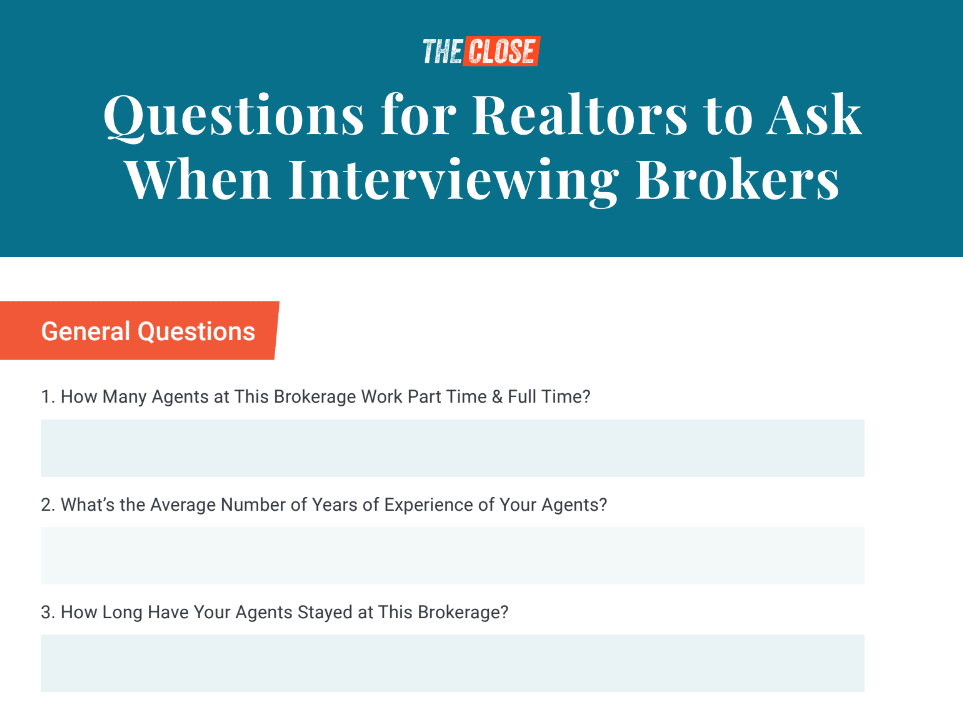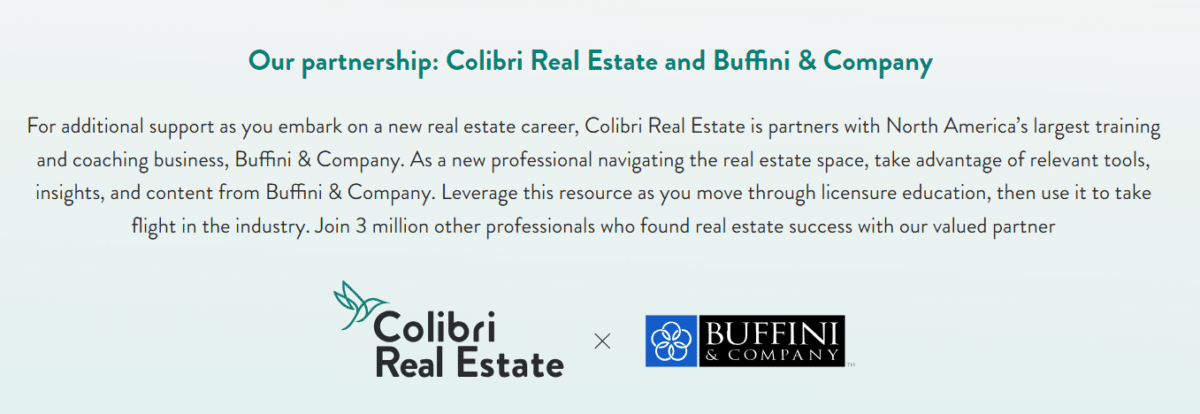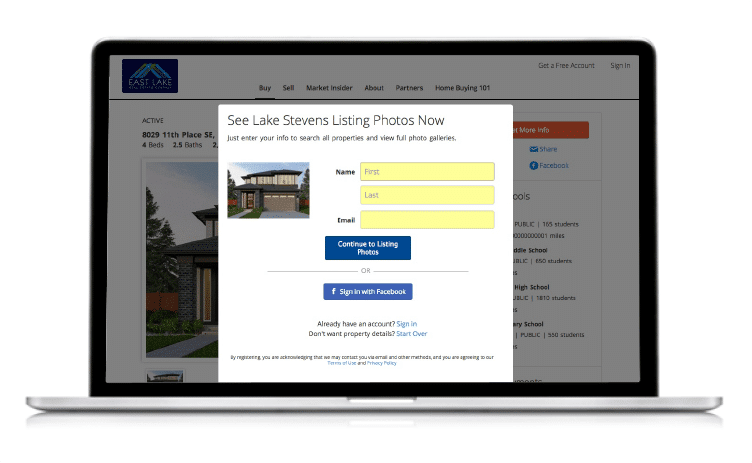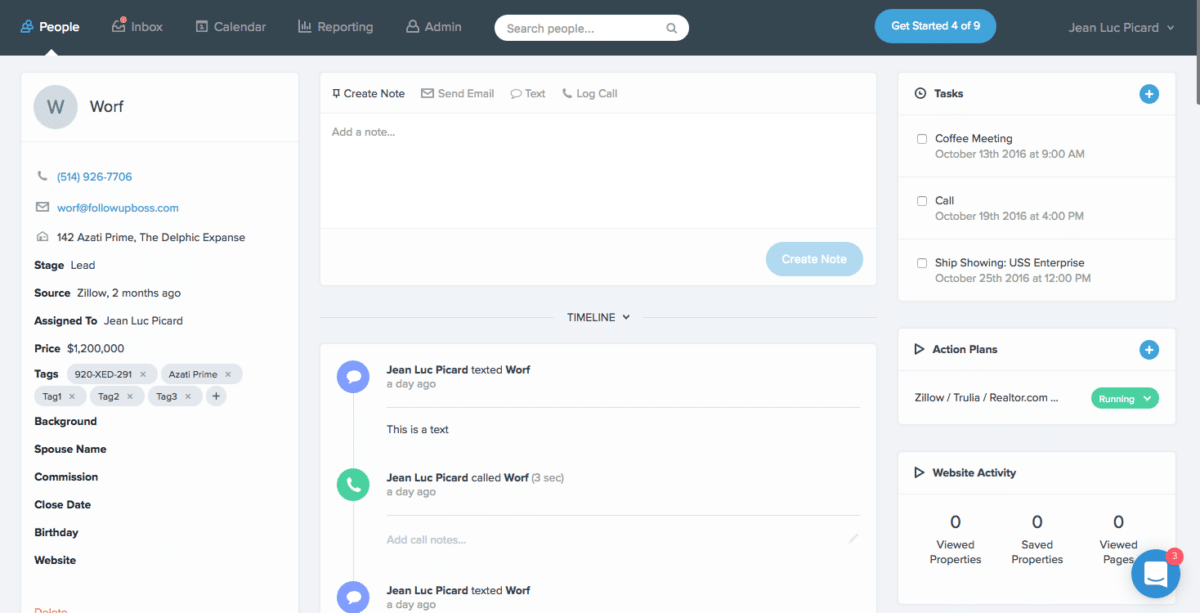Choosing the right brokerage to hang your license is incredibly important to your success in this industry. You want a brokerage with a great company culture and structure, top earning potential, resources and tools, and support. That means you must be picky and choose the best place for you. So yes, the broker is interviewing you, but you must prepare to interview them to determine if their company fits your needs.
So, are you wondering what to ask a real estate broker? Don’t worry. I’ll explore 23 crucial questions to ask a real estate broker when interviewing and give you examples of acceptable and unsuitable answers so you’ll know whether to jump on board or look elsewhere.
⭐Bonus: Download our list of interview questions and take them on your interview⭐

General Brokerage Questions
The first few questions to ask a real estate broker when interviewing might seem simplistic. Still, they’re important questions to accurately evaluate the company and ensure they share the mission and values you hope to attain in your real estate career. They also provide information about the size, policies, work environment, culture, and general well-being of the brokerage and its agents.
1. How Many Agents Work Here?
👍Good answer: “We have about X agents currently at XYZ Brokerage.”
🚩Proceed with caution: “I’m not sure. We have so many agents coming in and out.”
The number of agents at each brokerage depends on the type of brokerage where you interview. For example, boutique brokerages may have three agents, while franchises have thousands nationwide. So a great answer to this question depends entirely on your preferences of whether you want a large or small brokerage.
However, a wishy-washy answer is a red flag. The broker in charge should know how many agents work at the brokerage. It shows attention to detail and a responsibility to the licensees and clients who transact with their firm.
2. How Many Agents at This Brokerage Work Part-time & Full-time?
👍Good answer: “About X% of agents work full-time and Y% of agents work part-time.”
🚩Proceed with caution: “There’s a mix of both.”
The broker in charge should be able to give you a snapshot of the types of agents that work at their company and reveal agents’ work habits. A vague answer doesn’t give insightful information on the structure of the real estate firm. If your real estate career is a side hustle and the firm doesn’t want part-timers, it’s critical to know upfront. On the flip side, if you intend to dive into a full-time career, you want other agents around you doing the same thing.
3. What’s the Average Years of Experience of Your Agents?
👍Good answer: “We enjoy having new agents, but many of our agents have at least 10 years of real estate experience.”
🚩Proceed with caution: “All of our agents have less than a year of experience.”
While hearing that most agents at a brokerage are at a similar stage in their careers may sound appealing to a newly licensed real estate agent, joining a firm with primarily new agents can cause you to miss mentorship opportunities. Also, if the brokerage is established but the team is young, it may indicate a high level of turnover due to poor management.Statistics show that 87% of new agents fail within the first five years. When you surround yourself with experienced agents who understand a competitive market and have selling skills, they can offer mentorship.
If you’re already licensed and struggling to get your career moving, you will benefit from Kaplan’s professional development courses. The Real Estate Accelerator is an eight-hour intensive boot camp program designed to teach agents how to succeed and critical business-building skills for successful performance.
4. How Long Have Your Agents Stayed at This Brokerage?
👍Good answer: “Most of our agents have been working here for an average of 10 years.”
🚩Proceed with caution: “Well, most of our agents stayed here for one to two years.”
Agents are not required to stay with the same brokerage for their entire careers, and many agents hop around after they’ve gained experience. However, selecting a brokerage that can help you start and grow your career for many years is highly beneficial. This question is a great way to assess how well the brokerage can support agents with varying experience levels. Pro Tip: Some follow-up questions to ask the broker include, “Why have your agents chosen to leave after two years?” or “What reasons have agents stated for leaving your firm?” You might discover that the company has a legitimate reason for its high turnover rates. For example, some may have retired, left because of poor management, or had little opportunity for growth.
Pro Tip: Some follow-up questions to ask the broker include, “Why have your agents chosen to leave after two years?” or “What reasons have agents stated for leaving your firm?” You might discover that the company has a legitimate reason for its high turnover rates. For example, some may have retired, left because of poor management, or had little opportunity for growth.
5. Is There a Company Policy Manual?
👍Good answer: “Yes, here’s a copy for you to review.”
🚩Proceed with caution: “No, we don’t have a policy manual.”
If any business doesn’t have a policy and procedures manual, RUN! It shows a lack of organization and accountability. Before entering into a contract agreement, it’s critical to read their manual because it also highlights the brokerage’s standards, values, rules, and expectations. Since you’ll be aligned with this brokerage, you should have similar beliefs and visions for your business.
6. Are There Mandatory Meetings?
👍Good answer: “Yes, we have one mandatory monthly meeting to speak about the goals and financials of the brokerage, market trends, and general news.”
🚩Proceed with caution: “We never have meetings, and if we do, they’re spur of the moment.”
Real estate agents are independent contractors and do not have the same duties and expectations as employees. You will, however, be responsible for adhering to specific rules from your sponsored brokerage, such as mandatory meetings. A few here and there are great to meet with coworkers and get training. An onslaught of meetings or random meetings that also serve no purpose is a red flag.
7. What Is Your Involvement in the Community?
👍Good answer: “We host charity events where the proceeds go to a variety of foundations.”
🚩Proceed with caution: “No, we are not hosting and attending community events. We don’t have time.”
Real estate agents and brokers are busy people. However, real estate is a people business, so if the brokerage isn’t involved in the community to some degree, be wary. It could be hosting an event once a year, participating in community events with the whole team, or attending other brokers’ events.
8. Does Your Brokerage Have Social Gatherings?
👍Good answer: “We host and attend social gatherings. We do not require agents to attend but always encourage people to get to know everyone better.”
🚩Proceed with caution: “Our firm does not host and attend social gatherings. Those kinds of events are a waste of time”
Same with the above question, if the firm and its agents are not encouraging social events, be careful. A brokerage must host and attend social events because the real estate industry requires networking, and it provides a way to strengthen the bond between the team. However, hosting and attending social gatherings should not be mandatory, so watch for that, too.
9. What Is the Company Culture Like?
👍Good answer: “Our firm promotes an open culture, allowing employees at every level to share their ideas, suggestions, and concerns with us.”
🚩Proceed with caution: “It’s hard to describe our company culture, but we are a competitive group of agents.“
The most successful companies value the differences among their staff and agents and understand that diverse experiences and skill sets benefit the whole. Think about the culture in which you want to work. Spend some time at a brokerage or interview other agents and brokers to determine if it has the culture you’re looking for.
Be aware that some brokerages have more rivalry than supporting efficient and effective work in an enjoyable environment. While healthy competition between real estate agents is regular, it should not be misconstrued for bad attitudes, fighting, or situations that cause agents to leave.
Remember, employee turnover is an excellent indicator of whether the company has a healthy or toxic culture. Employees often stay longer if the culture is healthy since they are content and happy. Opportunities for continued growth are exciting and satisfying, and people tend to stay. A company with a harmful or toxic culture will have a higher turnover rate.
10. What Are the Brokerage’s Short- & Long-term Goals?
👍Good answer: “Our firm aims to increase our overall brand awareness and market share.”
🚩Proceed with caution: “Our company has no short-term or long-term goals. We’re just going with the flow.”
All successful businesses have clear goals they want to attain, and the firm’s goals and mission should align with the vision of your business. So, this is one of the best questions to ask a real estate broker. Pay attention to how the broker speaks about their aims and future ambitions. It can reveal a brokerage you’re willing to hop on board with or a company lacking organization and apathy.
Agent Support Questions
As a new or experienced real estate agent entering a new firm, knowing how the brokerage intends to support you and your business for success is crucial. These questions assess if they offer training programs, administrative support, technology, and other resources for you to thrive and acquire the skills to succeed in real estate.
11. What Kind of Training Is Provided?
👍Good answer: “We offer a two-week training program that teaches agents everything from organizing their schedule to generating leads to the entire real estate transaction process.”
🚩Proceed with caution: “We don’t train our new agents, but we can recommend some good books.”
You want a firm invested in its agents and provides the necessary tools and resources, so steer clear of brokerages without training and support. If nothing is offered, you’re either winging it or paying out of pocket for expensive coaching and mentoring. It shows a lack of the broker’s investment in its agents and likely high turnover.
Some brokerages have preestablished training programs for new agents; at other brokerages, it falls upon the agent to find a mentor. Experienced real estate agents will also need training if they encounter new technology, services, and policies to develop their skills further and update their knowledge.
12. Are There Mentorship Opportunities?
👍Good answer: “Yes, we provide mentors for our new agents.”
🚩Proceed with caution: “No, we don’t provide mentorship opportunities for our new agents.”
This is one of the best questions to ask a broker as a new agent. Many brokerages don’t mentor new agents, but it’s a nice perk when considering a new brokerage. If there’s no official program, inquire about the broker’s leadership style and management experience. A managing broker who enjoys the team’s success is a solid predictor of a high-performing real estate firm.

Suppose you’re looking for online career coaching. In that case, Colibri Real Estate has partnered with Buffini & Company to offer coaching and training at no extra cost in its post-licensing course packages. Licensees can watch hundreds of on-demand videos on different topics to gain real-world knowledge and experience to apply to their real estate careers.
13. Who do I Speak With if I Have Client or Transaction-related Questions?
👍Good answer: “If our agents have a client- or transaction-related question, they can ask their manager for advice and support.”
🚩Proceed with caution: “We provide reading materials, but there isn’t anyone specifically to speak with for questions. Agents can try calling the office; if someone is there, they may be able to help with questions.”
Agents of all experience levels are bound to have questions related to clients and transactions. They may encounter issues or situations they’re unfamiliar with or need advice to navigate the process without unnecessary difficulties. The brokerage you choose should provide a system where agents can get answers to their questions and learn how to handle challenging situations. This can be a managing or principal broker, a mentor, or a seasoned agent. If it’s not the manager, ask about the mentor or agent’s level of expertise.
14. What Does Your Firm Offer to New Real Estate Agents?
👍Good answer: “We provide headshots, access to conference rooms, a desk, and business cards for all new agents. Also, we offer marketing stipends, free buyer leads, and continuing education (CE) courses for credit toward license renewal.”
🚩Proceed with caution: “We don’t provide any agent support. You are on your own.”
While brokerages aren’t expected to provide anything to their incoming agents, many will include a few items to entice them to join the firm and help get their agents off the ground. If you’re an experienced agent, you may not need much support for your business. However, if you’re a new agent, you may require more support. Regardless, knowing you have at least some support benefits any agent.
Here are some standard real estate agent success support tools that many firms offer:
- Free leads or lead generation software
- CE courses for credit
- Marketing stipends
- Access to the firm’s listing
- Business cards
- Headshots
15. What Kind of Software or Technology Do You Provide?
👍Good answer: “One of the tools we use is Market Leader, which helps agents generate leads and convert them into clients.”
🚩Proceed with caution: “We don’t use technology tools because they are expensive. You have the multiple listing service (MLS).”
It’s common for franchises and virtual brokerages to provide access to real estate tools, such as client relationship management (CRM) software, social media management, and task management. On the other hand, boutique brokerages sometimes lack the financial resources to provide the same tools for their agents. Still, they should offer basic things like internet access, a custom web page, an email address, and CRM.

Market Leader provides an all-in-one solution for generating leads and converting them into lifelong clients. It includes a robust CRM, a website, and marketing automation. Its website tools are easy to use, widgets make adding content effortless, and the picture library provides quick access to great stock images. Market Leader guarantees exclusive buyer and seller leads each month based on a ZIP code and lead availability.
Financial Questions
Another vital factor that agents must know about their potential brokerage is how much they can earn. These questions to ask a broker when interviewing help you assess if the firm is willing to negotiate commissions, if the commission split is fair, and what the real estate fees are. Working for a brokerage that appreciates your expertise and allows you to earn and negotiate compensation based on your progress and contributions to the company is essential.
16. What Is the Commission Split?
👍Good answer: “Our commission split is 60/40.”
🚩Proceed with caution: “Our commission split is 20/80. You will receive 20% commission, while we keep 80%.”
Agents need to know the commission split they will receive to estimate their income. While the 20/80 split mentioned above may work for some agents, it is a significantly low commission to receive for any agent completing a real estate transaction, especially if no additional resources or incentives are involved.
While most people want to earn more money, it’s crucial to understand how your commission and support coincide. For example, your brokerage may offer an 80/20 split, with 80% of the commission going to the agent, but they may not provide any training, agent support, or technology. A 60/40 split, with 60% going to the agent, will offer a comprehensive training program, multiple technological tools, and an administrative assistant.
Even though the latter brokerage takes more from your paycheck, they offer you tools and resources in return. Use the other information you have gathered about the brokerage to judge which commission split is best for your business.
17. Are Commissions Negotiable?
👍Good answer: “Yes, we are open to negotiating commission splits, but we typically review them after seeing an agent’s progress at the brokerage.”
🚩Proceed with caution: “No, commission splits are not negotiable.”
If commission splits are nonnegotiable, proceed cautiously. Commissions should be negotiable like salaries. While real estate agents must typically pay a certain amount to their broker to keep the brokerage doors open, they can usually ask for a higher or lower commission split depending on experience and revenue.
Receiving this answer provides an opportunity to discover why. The commission split may be already generous or due to the number of tools and resources the brokerage offers its agents. The firm could be in its infancy and will open up negotiable commissions once they have enough revenue from the agent’s sales to be more flexible. Dig in to find the reason before making a final decision.
18. What Are the One-time & Ongoing Fees?
👍Good answer: “You must pay E&O insurance in a lump sum, pay for an annual MLS fee, and the technology fee is $100 monthly.”
🚩Proceed with caution: “I don’t think there are any additional expenses.”
This is a big red flag. The broker should know exactly what fees their agents are responsible for. Most real estate agents incur membership and marketing fees, but each firm manages its finances differently. Get a clear response to what costs you will be accountable for and ask questions about these fees to understand how each brokerage will impact your income.
A few possible expenses are:
- Desk fees
- Annual National Association of Realtors (NAR) membership
- Training
- MLS fees
- Technology
- Printing fees for mailers, business cards, and so forth
- Errors and omissions (E&O) insurance
19. What Is the Average Income of Your Agents?
👍Good answer: “Many of our full-time agents make between $70,000 and $100,000 annually.”
🚩Proceed with caution: “They probably all make $50,000.”
Here’s another area to proceed with caution. All brokerages have agents earning different incomes. But something isn’t right if they’re all making money at the lower end. While your earning potential in the real estate industry is limitless, knowing a ballpark figure of how much other agents are making at the brokerage is important when considering your options.
Lead Generation & Marketing Questions
It’s necessary for you to know the lead generation and marketing strategies the brokerage uses to build the business. While you will use your own lead generation strategies, if your brokerage has additional ways to capture and convert leads, it’s helpful to supplement your business.
Also, a brokerage’s marketing and branding will directly reflect your industry reputation. These questions to ask a broker reveal whether the brokerage has solid lead generation and marketing plans and if they can be beneficial for you.
20. What Is Your Target Market & Niche?
👍Good answer: “Our business’ niche market is condo owners, and here’s why…”
🚩Proceed with caution: “Well, we don’t have any niche market; we serve everyone.”
Yes, you want to serve everyone who comes through the brokerage doors, but your brokerage should have a target type of property, location, or market that they specialize in. Brokerages must carve out a niche and target market to position their firm as the go-to for a specific audience. It builds their reputation and results in a more focused business. Suppose you don’t know your target audience. In that case, you won’t be able to utilize language or address essential issues for clients, making your marketing, website content, and ad campaigns less successful.
21. Where Do You Focus Your Marketing Efforts?
👍Good answer: “We have found that social media outreach is the best way to connect with first-time millennial homebuyers, and our email list helps us nurture previous clients.”
🚩Proceed with caution: “Our business comes from friends and family or walk-ins, so we don’t focus on being seen online.”
You want to be where the people are (who just got Little Mermaid vibes?), so if the broker sees that being online is a waste of time or they feel they have enough business from friends, family, and those who happen off the street, they’re missing many potential clients. While the strength of a referral network will play a vital role in the success of any agent, more and more business is conducted online each year. In addition to running out of leads, a brokerage that doesn’t care about its online presence also risks being seen as out-of-date or not credible.
Successful marketing efforts include acquiring new leads, converting them into customers, and constantly expanding your network and reputation. However, the ideal approach to achieve this depends on your area and target market. You could use online, direct mail, Google advertising, or social media marketing. Besides, a great managing broker will know which marketing methods work and which don’t work in your area.
22. How Many Listings Does Each Agent Currently Have?
👍Good answer: “We currently average around 10 listings per agent.”
🚩Proceed with caution: “Some agents have 20 listings, and some have two listings.”
A brokerage may have many listings, but the distribution and system used to manage those listings impact the opportunities an agent will receive. While most brokerages have a few top producers, it might be a concern if one or two agents have the bulk of listings and other agents are having difficulty finding any. This might indicate that the brokerage fails to support and encourage its agents.
Most agents build their cache of prospects, but brokerages get walk-ins, emails, referrals, and phone calls from prospective clients. You will want to know how those prospects are distributed. You also want to understand why there is an imbalance. It could be a lack of agent support or mismanagement of the brokerage.
23. How Are Leads Distributed & Qualified?
👍Good answer: “We use an automated system that rotates the distribution of each lead.”
🚩Proceed with caution: “I just tend to give them to anyone near me at the time.”
When a buyer or seller contacts a brokerage for assistance, the brokerage has many options for transferring the lead. They can distribute leads by seniority, price point, round-robin, or first-come, first-served basis. How they decide to distribute leads reveals a lot about how the brokerage is managed and if they value fairness and transparency.
Finding clients without a track record is challenging if you’re newly licensed or in a new location. If leads are distributed relatively evenly, you can be assured you will have some business while you ramp up your sphere of influence and leads database.

Lead distribution systems and lead generation companies benefit agents and the brokerage, guarantee clients are taken care of, and ensure agents have sufficient business. Follow Up Boss provides automation tools to generate and move real estate leads through the sales pipeline. It also offers essential features like workflow automation, allowing agents to engage with leads by sending a follow-up email or a greeting on their birthday.
FAQs
What is the most asked question to a real estate agent?
The most commonly asked question to real estate agents in an interview by a brokerage is usually about their experience in the industry. Brokerages want to know how long the agent has been working as a real estate professional and what kind of transactions they have handled. They may also ask about the agent’s sales record and their knowledge of the local market. The focus is on assessing the agent’s qualifications and suitability for the job.
What is important when choosing a broker?
When choosing a broker, it is important to consider their experience level, reputation, and the range of services they offer. Ensuring the broker is licensed and regulated by a reputable authority is also vital. Additionally, comparing fees and commission rates to verify you are getting the best value for your money is a good idea.
What can you expect to learn from a broker?
In an interview with a broker, you can expect to learn about their industry experience, approach to customer service, types of services they offer to clients, and fees and commission structure. You can also ask about their business philosophy and how they stay current with market trends. The interview should give you a good sense of whether the broker fits your business needs.
Bringing It All Together
As you gather answers to these questions to ask a real estate broker, remember that each brokerage is different in structure, values, operation, and management styles. Even if they offer you an answer that doesn’t align with your values, it doesn’t mean it is wrong—it may just be the wrong brokerage for your needs. Instead, see it as a hint that you should ask follow-up questions for further clarity.
Are there other important questions we missed? Let us know in the comments below!












Add comment